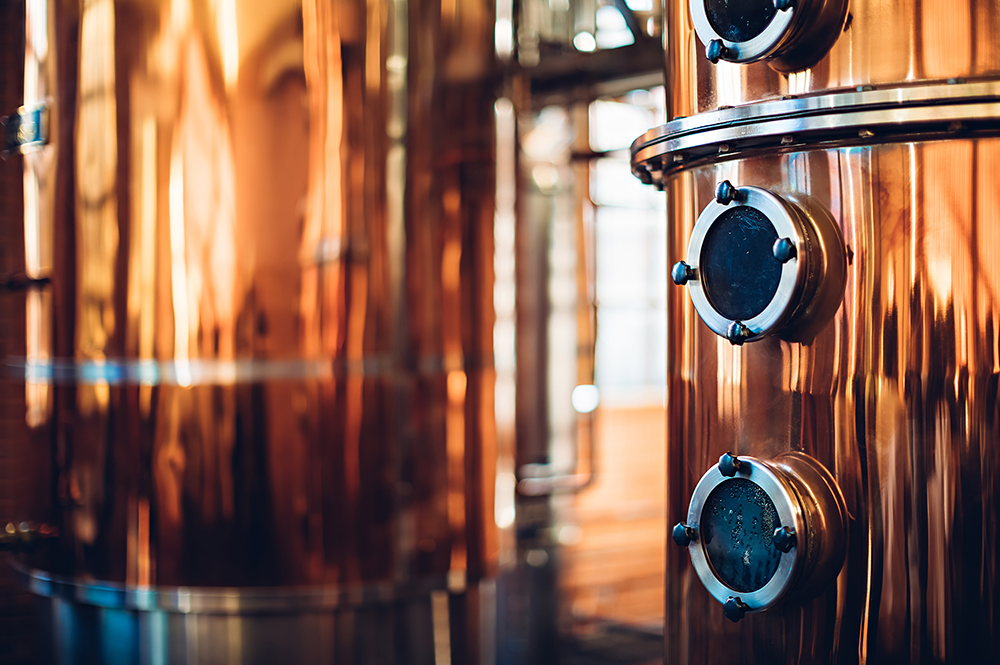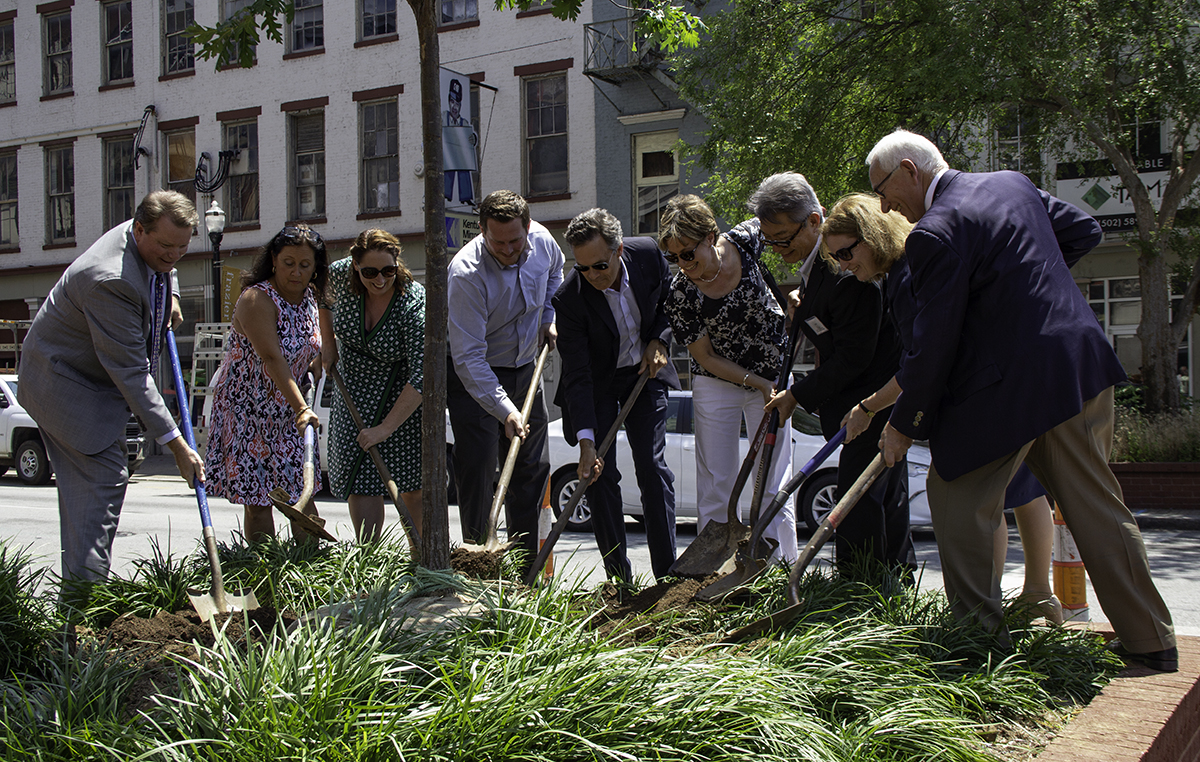Stories
Whisky is a passion to explore. From the history of the spirit to the evolution of the industry, the story of whisky helps fuel that passion. Often, it’s easy to forget that whisky is also a global multibillion dollar industry. The stories of whisky — from news and new releases to in-depth inquires and what goes on behind the label — blend together to help us appreciate the spirit of whisky.

“W9” Stress Unity At First “Whisky Summit” in Louisville

July 26, 2018 – To show their unity, leaders of the nine major whisky trade organizations planted an American White Oak tree on the corner of 9th and Main Street outside the Frazier History Museum in downtown Louisville following their first-ever summit meeting. Even before the first shovel of dirt was turned, observers noted that the raised brick-lined bed had routinely been damaged by vehicles using 9th Street to merge onto Interstate 64 and wondered how long the tree would last before being wiped out by a recklessly driven truck.
It’s an apt metaphor for the state of the whisky industry weeks into a global trade dispute pitting the United States against many of its most important global trading partners, many of whom have imposed punitive tariffs on imports of American-made whiskies to retaliate for the Trump Administration’s tariffs on their exports of steel and aluminum to the US. Years of growing global whisky sales spurred by reduced – or eliminated – import tariffs are now threatened as whisky has become one of many pieces in play in a political game of “chicken.” With their collective futures at stake, the Kentucky Distillers Association invited colleagues from the other trade associations representing the world’s major whisky and distilled spirits producers to a two-day conference in Louisville.
 “Together, we form the W9, or the ‘Whisky 9,’ to serve as an open exchange of ideas, strategy, and a shared commitment to preserving free and fair trade,” KDA President Eric Gregory announced at a news conference following the closed-door “Spirit of Collaboration Summit.” As an example, Gregory cited the significant growth of whisky traded between the US and the European Union following the elimination of most tariffs in 1997 and similar expansion in trade with Canada following the elimination of tariffs in 1995 with the North American Free Trade Agreement.
“Together, we form the W9, or the ‘Whisky 9,’ to serve as an open exchange of ideas, strategy, and a shared commitment to preserving free and fair trade,” KDA President Eric Gregory announced at a news conference following the closed-door “Spirit of Collaboration Summit.” As an example, Gregory cited the significant growth of whisky traded between the US and the European Union following the elimination of most tariffs in 1997 and similar expansion in trade with Canada following the elimination of tariffs in 1995 with the North American Free Trade Agreement.
“The bottom line: the world whisky market is large, and it’s growing, and we all drink one another’s whisky,” Gregory said. “Trade agreements have been important to the development of this large and diverse market that consumers have chosen to create, and that’s why we started expressing concern when our industry was caught in the middle of this dispute.” The summit produced unanimous agreement on a resolution calling on world leaders to de-escalate the current trade conflicts and return to a system of “free and fair trade.”
Listen to the “Spirit of Collaboration Summit” news briefing:
The summit started late Wednesday, hours after a White House meeting between US President Donald Trump and European Commission President Jean-Claude Juncker. That meeting, while not producing any concrete agreements, resulted in both sides agreeing to hold off on additional sanctions against each other while negotiators work toward a resolution of the original dispute over steel and aluminum trade. If – and only if – an agreement on that issue can be reached, it would clear the way for the European Union to remove its tariffs on American-made whiskies and other exports.
 Without exception, the industry leaders praised that development as a positive step. According to Scotch Whisky Association CEO Karen Betts, the Trump-Juncker meeting “clearly has put a positive momentum behind trade talks between Europe and the US, and we hope that those now move forward to strengthen that really important trading relationship.”
Without exception, the industry leaders praised that development as a positive step. According to Scotch Whisky Association CEO Karen Betts, the Trump-Juncker meeting “clearly has put a positive momentum behind trade talks between Europe and the US, and we hope that those now move forward to strengthen that really important trading relationship.”
The pause in rhetoric would appear to delay the retaliatory moves threatened by the Trump Administration following the tariffs imposed by the EU, Canada, China, Mexico, and Turkey over the last month. The administration’s public position has been that retaliation could come in the form of new tariffs on imported cars and auto parts. While Japan has not yet joined the list of countries targeting American whiskies, Jun Tanaka of the Japan Spirits & Liqueurs Makers Association predicted his country would likely follow suit if the US made that move.
“I think our government has tried to persuade the US government in a quiet way,” he said in an interview. “If things come to cars and automobile parts, an important Japanese product, they would think about retaliating.” Tanaka also pointed out that his country is also being affected by the current tariffs on American whiskies, since Suntory (Beam) and Kirin (Four Roses) have significant investments in the United States.
While some of the large American whisky makers have been able to minimize the impact of tariffs on their export sales by shipping extra stock to Europe and Canada in the first half of 2018, the largest impact so far has been felt by craft distillers. Margie Lehrman of the American Craft Spirits Association represented her members at the summit, and noted several instances where the trade dispute created problems even before the imposition of tariffs.
“Just the threat of some sort of trade war was enough to cut down discussion and any kind of negotiations on contracts,” she said, citing a specific case where an importer forced one of her members to reduce its wholesale prices by 15 percent while an export shipment were in transit or risk losing the entire deal. “I have one distiller in Ohio who let me know he expected next year to do about 25 percent of his volume going to export, and now it’s been cut down to 15 percent. In terms of dollars, that makes a big difference…he didn’t say what is not going to happen, but I’ve talked with others who said ‘you know, we were just about to institute these health benefits for employees…might not be able to do so now.'”
Lehrman and her colleagues also cited the ripple effect of tariffs throughout the economy, especially for agricultural-based products like whisky. The effect has been felt widely throughout the agriculture industry, which was promised up to $12 billion in assistance by President Trump this week. However, the tariffs reach all the way from agriculture to transportation, the manufacturers who produce bottles and packaging, and other industry sectors.
Gregory’s team put together the summit in just a couple of weeks, and he deemed it a success. While members of Congress were turned away after requesting to attend the meeting, they have been in regular contact with the KDA. It also appears the industry leaders will be in regular contact with each other following this inaugural summit, as Gregory noted.
“I thought it was a good sign when we all met last night and got talking…and people were already talking about where to hold the summit next year,” he said.
Listen to this week’s WhiskyCast for more coverage of the Spirit of Collaboration Summit.
Links: Kentucky Distillers Association | Scotch Whisky Association | American Craft Spirits Association



